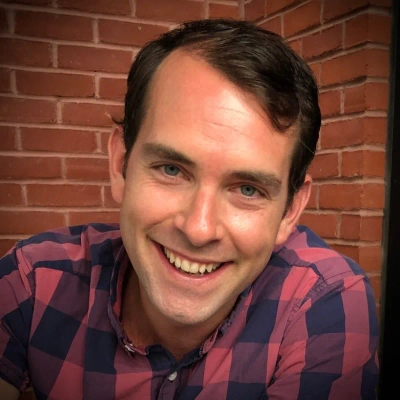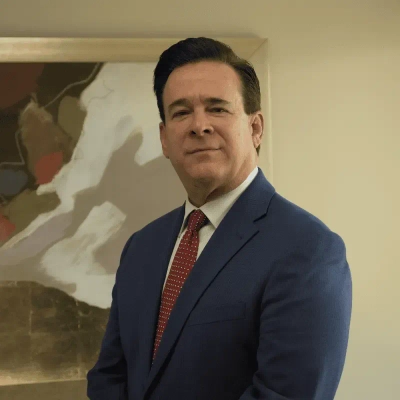25 Lessons Learned from Navigating Financial Crises That Every Business Owner Should Know
Financial crises can make or break businesses, but learning from those who have weathered the storm can significantly increase survival chances. This comprehensive guide brings together hard-won wisdom from experts who have successfully managed through economic downturns across various industries. Their experiences reveal practical strategies for everything from securing customer investments to building financial buffers that can help business owners prepare for and overcome challenging market conditions.
Secured Customer Investment During Startup Crisis
During a particularly challenging period for my startup, I took an unconventional approach by approaching our largest customer to invest in our company when traditional funding sources weren't available. While this decision came with some restrictive commercial terms that were difficult to accept at the time, it ultimately proved to be the lifeline our business needed to survive the downturn. Looking back, the lesson I wish I had known beforehand is that sometimes the most valuable investors can be those who already understand and benefit from your business model. Despite the initial constraints, this strategic partnership eventually led to significant growth and meaningful profitability four years later, demonstrating that sometimes the right financial partner matters more than perfect terms.

Transparency Turned Fear Into Strategic Action
One of the toughest financial downturns I faced came when a key client unexpectedly pulled out of a major contract that accounted for a large portion of our recurring revenue. Overnight, our forecasts went from healthy to uncertain. The hardest part wasn't the numbers—it was managing fear. My instinct was to rush into fixes, but doing that would've amplified panic instead of restoring stability.
So, I slowed down and focused on transparency and triage. I called an all-hands meeting and laid out the reality: what we'd lost, where we stood, and what we could control. Then, we got practical. We reviewed every expense, prioritized initiatives tied directly to revenue, and paused the rest. Instead of cutting reactively, we asked one question: "What investments will still matter six months from now?" That framing helped us protect long-term value while regaining short-term control.
The turning point came when we opened our books to the leadership team and invited solutions from everyone. What followed was incredible—a burst of creativity that led to new offers, faster pivots, and renewed ownership. Within months, we had replaced the lost revenue with more diversified streams and a much stronger foundation.
The biggest lesson? Cash flow is survival, but communication is strategy. I used to think a financial crisis was a math problem—it's not. It's a people problem disguised as one. Numbers can tell you what's wrong, but only trust and alignment can fix it.
If I could go back, I'd build those systems of transparency earlier—weekly cash flow reviews, shared dashboards, and clear decision frameworks—so the team could act fast without waiting for direction. Because in a downturn, speed doesn't come from panic; it comes from shared clarity.
Kitchen Renovation Saved My Rental Business
When the housing market crashed, a few of my rental units sat empty for months. I was sweating it. What turned things around was gutting one kitchen and letting a new tenant pay their deposit over two months. That brought in better people and stabilized my cash flow. My advice to my past self? Keep a bigger emergency fund. Something always breaks or someone always moves out unexpectedly.

Cancer Treatment Revealed Market Transparency Issues
When I went through cancer treatment in 2022, I experienced a financial strain that tested every part of my planning. Even with solid insurance, the costs were high and constant. To manage them, I decided to sell some of my jewelry, thinking it would be a straightforward process. It turned out to be confusing and discouraging. Every buyer I approached quoted a different price, often far below the real value. The entire experience showed me how little transparency existed in a market that people often turn to in moments of need.
That period taught me the importance of access and fairness in financial exchange. People deserve clear information and a reliable way to understand what their assets are worth.
That understanding shaped how I built my next venture. I focused on creating a platform that allows anyone to exchange precious metals with confidence and trust. My goal was to remove unnecessary complexity and make the process direct and fair. What began as a personal financial challenge became a driving force behind building something better for others.
Subscription Model Rescued Agency During Downturn
When the market went sideways, I shifted our agency from one-off projects to a monthly subscription model. That single move saved us. Suddenly we could make payroll every single month, even as clients started slashing their marketing budgets. I wish I had done it years ago. So if you run a service business, get those recurring contracts locked down before you need them. They're what keep the lights on.
Breaking Down Challenges Into Manageable Steps
During the 2009 financial crisis, I focused on realigning with my core business values of integrity and resourcefulness to navigate through the uncertainty. A key approach that helped me was breaking down overwhelming challenges into smaller, more manageable steps that my team and I could address one by one. Looking back, I wish I had understood earlier that failure is not an endpoint but rather an integral part of the entrepreneurial journey that creates opportunities for growth. This mindset shift would have reduced my anxiety and allowed me to make decisions with more confidence during those difficult months.

Data Guided Strategic Business Closures
When facing financial challenges in my early ventures, I learned to rely heavily on data rather than emotion to guide my decisions. The financial numbers clearly indicated when a business model wasn't sustainable, and I had to make the difficult call to close several early ventures rather than continuing to invest in failing enterprises. The most valuable lesson I learned was that walking away from a business that isn't working is actually a strategic decision, not a personal failure. Looking back, I wish I had understood earlier that preserving resources by closing unprofitable ventures actually creates opportunities for future success. This perspective shift from seeing closure as failure to viewing it as strategic resource management completely transformed my approach to business risk and financial downturns.

Pivoted From Hardware to Software Solutions
Navigating a financial downturn in the interactive multitouch systems industry required swift adaptation and innovation. During a significant client freeze on technology investments, I focused on diversifying our offerings—pivoting from solely hardware to software solutions and services. One key lesson I learned is the importance of proactively building a financial buffer and fostering recurring revenue streams. If I had anticipated the volatility of hardware dependency sooner, I would have transitioned toward hybrid models earlier, ensuring greater stability during uncertain times.

Deepened Core Services With Existing Clients
During the last major downturn, we shifted our focus entirely to reinforcing relationships with our existing client base. Instead of stretching our resources to chase new, uncertain leads, we deepened our core service offerings in managed IT and cybersecurity. The lesson learned was that customer loyalty is your greatest asset in a crisis. I wish I had known earlier how much financial stability comes from nurturing existing clients over constantly pursuing new ones.
Diverse Skills Enabled Pandemic Business Pivot
During the early COVID pandemic when real estate transactions nearly froze, I had to pivot from our traditional home-flipping model to offering virtual consultations and remote property evaluations. Drawing from my mortgage banking experience at Rocket Mortgage, I helped homeowners understand their refinancing options while still purchasing properties at fair prices. The lesson I wish I'd known beforehand is that diversifying your skill set before a crisis hits is crucial--my background in both mortgages and real estate allowed me to serve clients in multiple ways when one revenue stream dried up, something I stumbled into rather than strategically planned.
Prioritized Core Crew Over New Markets
Navigating a financial downturn is like getting hit with an unexpected cold front—you have to secure the perimeter and stop the bleeding immediately. The difficult financial crisis we faced wasn't a national one; it was a sudden, localized drop in storm work that left our core crews idle for three months.
My immediate response was to look at the spending on the job site. I didn't lay off my core crew, because I knew losing that hands-on quality would kill the business in the long term. Instead, I aggressively cut all the financial chaos of inefficiency. I sold off older, inefficient equipment that was draining repair money. I stopped rush ordering and forced our supply chain to stick to bulk orders only, no matter how inconvenient it was. I was eliminating financial leaks, one structural flaw at a time.
The single lesson I learned that I wish I had known beforehand is that hands-on integrity is your best marketing during a downturn. In the crisis, I wasted time trying to find new, distant jobs to fill the gap. I should have spent all that time doubling down on the one thing we could control: the quality of our past work.
When the work dried up, I learned that the client who is still spending money is looking for a sure thing. If I had simply spent the idle time checking in with past clients, offering free gutter cleanings, and asking for referrals, those personal commitments would have generated the hands-on, local jobs that kept us alive. The best way to navigate a financial crisis is to be a person who is committed to a simple, hands-on solution that prioritizes long-term trust over short-term sales panic.
Created New Offerings Instead of Cutting Back
In the early months of the pandemic, our revenue dropped by nearly 40% almost overnight. At first, I panicked and started looking for ways to cut costs fast—pausing marketing, delaying hires, trimming anything that wasn't essential. But I soon realized that focusing only on defense was paralyzing us. So, I gathered the team and shifted the mindset: instead of asking "What can we cut?" we asked "What can we create?" We repackaged our services for smaller clients who were still operating, introduced flexible payment plans, and doubled down on personal outreach instead of advertising. Within three months, we'd stabilized cash flow and even added new recurring clients who stuck with us long after things recovered.
The biggest lesson I learned was that survival isn't just about shrinking expenses—it's about staying visible and adaptable when everyone else retreats. I wish I'd known earlier that in a downturn, clarity, and creativity are more valuable than panic-driven cuts. That experience taught me to always keep a small "resilience fund" and a plan for how to pivot quickly, so that when the next disruption comes—and it always does—we're not reacting in fear but responding with intention.
Client Diversification Prevents Revenue Dependency
During the 2008 downturn, we lost one of our biggest clients almost overnight—a national firm that decided to bring IT in-house to cut costs. At the time, they made up nearly 30% of our revenue. It was a gut punch. I remember sitting at my desk, staring at the numbers, thinking, "How are we going to make payroll in three months if this keeps up?" Instead of trying to replace that revenue all at once, we focused on going deeper with the clients we still had—offering more value, identifying new ways to support them, and rolling out fixed-fee service bundles that gave them predictability in a chaotic time.
The lesson I wish I had learned earlier: don't build a business that's too dependent on one client. It's tempting to treat a big account as a safety net, but it's actually a risk. Diversification doesn't just apply to investments—it applies to your client base too. Since then, I've been far more disciplined about not letting any one client exceed a certain percentage of our revenue. It keeps the business healthier and gives you more options when things get bumpy.
Built Relationships With Community Lenders Early
During the 2008 downturn, I shifted my strategy from short-term flips to long-term rentals by securing fixed-rate mortgages at historic lows. The lesson I wish I'd known earlier? Building relationships with community lenders before a crisis is critical--they provided the financing when national banks retreated, allowing me to acquire properties that now form the bedrock of my passive income.

Trusted Advisors Guided Critical Decision Making
I remember one financial crisis early in my business like it was yesterday. We had just launched a new product line, cash was tight, and suddenly a major client pulled out at the same time that our supplier increased costs.
I remember having long calls with my co-founder at two in the morning, talking through every single decision, weighing the risk of keeping someone on versus the morale cost of layoffs. It was exhausting, terrifying, and humbling all at once.
The thing that got me through was talking to people who had been there before. Mentors, former founders, and even a friend who had run a small business. That helped me prioritize and act without panicking. We made some tough choices, cut a few non-essential expenses, renegotiated some terms with suppliers, and leaned into the customers. It didn't fix everything overnight, but it kept us alive and set a pattern for decision-making that lasted long after the crisis passed.
The lesson I wish I had known beforehand is simple: never assume things will sort themselves out and never underestimate the value of having trusted advisors.
Radical Honesty Built Trust During Uncertainty
When interest rates spiked and deals slowed to a crawl, I made a conscious choice to double down on transparency with sellers rather than try to 'sell through' the uncertainty. I started showing them real numbers, even when it meant telling them waiting might be better. The lesson I wish I'd learned earlier is that honesty, even when it costs you a deal in the short term, builds a reputation that sustains you when the market turns upside down.

Established Stability Fund After Restructuring Deals
How did you navigate a particularly difficult financial crisis or downturn?
I was forced to make drastic decisions in one of my most difficult financial crises to keep my motorcycle rental company afloat. Travel came to a complete halt, resulting in significantly fewer bookings coming through our platform. Simultaneously, fixed costs, including tech infrastructure, vendor contracts, and staff salaries, did not go away. Instead of navigating out of fear, I was checking the numbers on a day-to-day basis and identified where I could be flexible without sacrificing anything that riders should expect. For instance, we restructured deals with a couple of local partners, moving from fixed monthly commitments to performance-based arrangements that bought us some breathing room and also preserved our partnerships.
What's one lesson you learned that you wish you had known beforehand?
The lesson I wish I had known then is to have a cash reserve enough to keep you going for several months. During high-growth times, it becomes easy to focus on scaling alone and assume that demand will always be growing, but downturns can sneak up faster than you expect. If I had been disciplined in setting aside reserves earlier, I might have saved myself from some of the difficult trade-offs I was forced to make under pressure. Since then, I've developed a habit of segregating a "stability fund" not to be used on growth projects but just to be there in case revenue takes an unexpected dip and to keep the business running.
It taught me that leadership is not waiting to take steps until the storm passes, but rather, looking for a way forward. I also got much more direct in my communications with staff and partners, and that transparency inspired trust even for tough decisions. Looking back, I'm grateful I didn't wait to act fast because the changes we made then set the foundation for a healthier and more resilient business now.
Cash Reserves Enable Opportunities During Downturns
During the 2008 housing collapse, I learned quickly that adaptability meant survival. We shifted our business model from primarily flipping properties to helping homeowners navigate short sales and foreclosure alternatives. The critical lesson I wish I'd known was the importance of maintaining substantial cash reserves--not just for survival, but for capitalizing on opportunities when everyone else is retreating from the market. When others panic and prices drop, that's when generational wealth-building opportunities emerge for those financially prepared to act.

Local Partnerships Created Resilience Through Crisis
During the early COVID slowdowns, I leaned on my deep local roots to innovate--partnering with Wilmington small businesses to offer combined services like moving assistance and storage discounts with home purchases, easing sellers' transition costs. The lesson I wish I'd internalized earlier? Community infrastructure is your lifeline; investing in neighbor relationships consistently pays compound dividends when crisis hits and traditional systems fail.

Renegotiated Contracts Preserved Team Morale
During a downturn that hit several of our major clients, cash flow dropped sharply, and it forced me to reassess every expense line. Instead of cutting staff or freezing operations, I focused on renegotiating vendor contracts and shifting to shorter client payment terms. Those two moves stabilized our liquidity faster than expected and preserved team morale.
The biggest lesson I learned was that crisis planning should happen before the crisis. I wish I had built more flexible contracts and stronger cash reserves earlier. Now, I maintain a rolling 6-month liquidity buffer and review all agreements quarterly. Preparation gives you leverage when the market turns—and that's what keeps a business steady under pressure.
Became a Resource Beyond Just Buying Houses
In a downturn, I found that my most valuable strategy was to stop sending generic 'we buy houses' mailers and instead listen for the specific problems homeowners were facing. Instead of a hard sell, I'd ask, 'What would help you most right now?' which sometimes led to me buying their burdensome house and other times just connecting them with reliable movers. I wish I'd known sooner that being a resource, not just a buyer, is what builds a resilient business--the goodwill I created led to more referrals than any marketing campaign ever could.

Conduct Stress Audits Before Storms Hit
Facing cash flow challenges during the pandemic, I leveraged my finance background to restructure our entire business model within weeks--temporarily shifting from property acquisitions to fee-based consulting and portfolio analysis for other investors. The unforgettable lesson? Don't wait for storms to test your foundations: conduct annual 'stress audits' on your business plan well in advance--that's how I now identify operational vulnerabilities before they become crises.
Track Local Data Signals for Market Shifts
I wish I'd known one thing during my first market downturn: track the boring local data. I'm talking foreclosure filings, local job losses. It took a minute to get the hang of it, but suddenly I could see things coming. Once, when everything stalled, I switched to cash offers. My deals kept moving while everyone else waited on lenders. It felt weird, but it worked. Honestly, watch the small local signals and be ready to change your plan when things get strange.
Build Flexible Plans for Unexpected Situations
The pandemic's initial period found us operating in pre-launch status because we had no revenue but maintained our dream and construction work. The entire operation came to a standstill because suppliers faced delays while lenders lost confidence and no one knew if people would want to use bathtubs after the pandemic. The situation made me believe that all our progress was under threat.
The most important lesson from this experience taught us to include flexibility when creating our plans. Our initial plan included too many fixed steps. Major sections of our work required complete rework because we failed to make swift adjustments when things changed. I reserve space for unexpected situations because the path to success will never follow the original plan.

Financial Buffer Builds Pre-Crisis Resilience
During the early months of the pandemic, my law firm in Miami faced an unexpected financial downturn. Courts slowed down, new personal injury cases stalled, and many clients were hesitant to move forward with claims. Our revenue dropped sharply while overhead stayed the same. I had to make quick decisions to keep the business afloat without sacrificing the quality of service or losing valuable team members.
The first step I took was reviewing every expense line by line. We paused nonessential spending and renegotiated vendor contracts. At the same time, I shifted our focus to digital marketing and streamlined our intake process so we could capture and retain new leads more efficiently.
The lesson I learned and wish I had known sooner was the importance of having a financial buffer and a diversified pipeline. I had always operated with confidence in steady cash flow, but I now understand the value of preparing for the unexpected. Since then, we have built a reserve fund and created multiple lead sources that keep the business stable even during slow cycles.
That experience taught me that resilience is not built during the crisis. It is built in the quiet months before, when no one thinks they need it.















